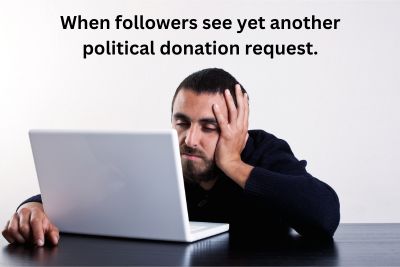Introducing Our New Website Maintenance Services
We are pleased to introduce our latest offering – Website Maintenance Services – designed to streamline your experience in managing your Online Candidate website.
Why We Started This Service:
At Online Candidate, we’ve always valued client feedback and suggestions. Some have expressed the desire for professional assistance with campaign site updates. That’s why we’re excited to introduce our Website Maintenance Service – to cater to your needs and provide you with a hassle-free solution.
Maintain Control, Your Way:
We understand the importance of retaining control over your website. You always have the option to update your site on your own or take advantage of our update services whenever you choose.
Here to Help:
Our maintenance service brings you a range of benefits to your Online Candidate website management:
- Here to help: Simply send us the content and design changes you need, and we will take care of them promptly and efficiently.
- Save Time: We recognize the value of your time. Let us handle the updates, freeing you to focus on your political mission.
- Quick Turnaround: We commit to delivering your updates within one business day.
- Fast, Complete Updates: As the creators of the Online Candidate content system, we are well-versed in its workings. Most updates can be completed within the quarter-hour minimum time.
- Flexible Options: You have the flexibility to submit change requests as needed.
For more information and answers to frequently asked questions, visit our Website Maintenance Service page.
3 Online Campaigning Facts and Myths
In the world of online campaigning, it can be tempting and dangerous to make assumptions. When it comes to digital strategies, it’s easy to make decisions based on outdated information. So, let’s bust a few myths that many candidates have when starting an online political campaign.
Myth: A Facebook page can replace a campaign website
Fact: While most political campaigns have a Facebook page, it should not take the place of a dedicated campaign website. Facebook certainly has an enormous audience and offers a variety of tools for engaging with supporters.
But it also has limitations.
Facebook is a closed network, meaning content visibility relies on users being members of the platform. This exclusivity can restrict your reach, as not everyone is a Facebook user. Additionally, the platform’s terms and conditions can be stringent, leading to potential content removal and suspension risks.
On top of that, Facebook’s algorithm limits the organic reach of your posts to just a fraction of your followers. (Maybe 5% if you’re lucky.) To ensure your message reaches your audience, you will need to invest in advertising or boosting posts, which has its own costs.
The best approach is to treat social media platforms as valuable tools for engagement. It’s your campaign website where you have complete control over your content and messaging.
There’s a saying, “Don’t build your home on someone else’s land.” Remember that your social media content only exists at the pleasure of the social media platforms. That can change anytime.
Myth: The internet will pull in donations effortlessly
Fact: While the internet has opened up new fundraising opportunities, simply having a website or donation buttons is not a guarantee that anyone will contribute. Online fundraising requires careful planning, strategic coordination, and active engagement with potential donors.
To maximize your online fundraising efforts, integrate your digital presence with offline events and outreach. Let them know how they can help and persuade them to give.
Remember that all fundraising success is a result of consistent effort, creativity, and the ability to showcase the impact donor’s contributions.
Related: Maximizing the Impact: Best Practices for Online Donations
Myth: Candidates can wait until the last minute to start online campaigning
Fact: Early online campaigning is essential to building a strong and engaged online community. Candidates who wait until a month before the election to start an online presence are missing the boat. While getting online is not difficult, building a level of online exposure takes time. If you are on a tight budget, it makes sense to start raising seed money as early as possible. One of the best ways to do this is through online fundraising.
Creating a positive and accurate online presence takes time and effort. Start by refining your existing digital footprint and establishing a presence on major social media platforms. Build a following of friends and supporters, and nurture these relationships over time.
By having an established digital presence, you can leverage your network when officially announcing your candidacy. By having an early number of online supporters, you can leverage that existing network to gain more immediate exposure.
Related: Why Starting Your Campaign Website Early Makes Sense
Additional Online Myths:
Myth: Social media is the only online advertising you need
Fact: Email marketing, a campaign website, and other online advertising channels should complement social media advertising. Diversifying your digital strategy increases your audience reach. And, of course, you’ll still need traditional advertising methods like direct mail and canvassing.
Myth: Online campaigning is only for young voters
Fact: Like your constituency, online audiences encompass people of all ages and backgrounds. Tailor your message to resonate with various demographics. And be prepared to engage with supporters from all walks of life.
Online campaigning can make a big difference in your election, but you need a strategy to harness the full potential of the digital landscape.
For less than the cost of a mailing, you can have a complete campaign website. Online Candidate website packages contain an easy-to-use campaign website builder, built-in pages and forms, and free access to exclusive resources, including our suite of political AI tools.
It’s Summer – Time To Get Your Political Campaign Underway!
For most people, the summer means long, lazy days, fun in the sun, and family vacations.
But if you have an election this fall or a primary coming up, now is not the time for relaxing by the pool.
Labor Day is considered the traditional start of the political campaigning season. By then, party primaries have ended, and voters are just starting to pay attention to the upcoming elections. However, if you wait until the end of August to start the groundwork for your offline and online campaign, you’ve waited too long.
Starting your campaign preparations early ensures you’re not scrambling last minute. You’ll experience a smoother process and have time to address unexpected issues. Early groundwork during the summer lets you build a solid foundation of volunteers, voters and donors, so by the time the traditional campaign season starts in September, you’re already ahead. This preparation will reduce stress and increase your confidence because you’ll already have systems in place and will be ready to focus on voter engagement.
Successful candidates plan ahead. Over the next few months, you’ll need to get your campaign plan together, raise initial funds, and get your campaign staff and volunteers organized. Here are a few things you’ll want to work on during the dog days of summer…
Get your finances in order
Appointing a campaign treasurer right away means you’ll have someone dedicated to managing your funds, ensuring your financial activities are legal and organized. This can prevent financial missteps and allow you to focus on campaigning.
Do you plan on raising and spending money for your election? If so, you’ll want to appoint a campaign treasurer and create a bank checking account. You’ll need one if you plan to take online donations. Start early as it can take time for an online donation service to verify your account and set up donation pages.
If your campaign is large enough, setting up a finance team to handle budgeting and spending tracking can make a huge difference. This team will set up the campaign’s budget, track all expenditures, and ensure that the campaign abides by all relevant laws and regulations. For federal congressional campaigns, this can include registering with the Federal Election Commission (FEC) and filing reports and other paperwork.
Working with your fundraising committee early helps you meet financial goals through various activities, easing the pressure of fundraising. Setting up an online donation service early is crucial; delays in verification can stall your fundraising efforts. With these preparations, you’ll experience fewer financial headaches and be more effective in your campaign efforts.
Start preparing your campaign website content
A campaign website is a critical tool for politicians today. Developing your campaign website early will be central to your campaign, offering updates, fundraising, and volunteer recruitment. A candidate website can be used to accept contributions, post updates, and get people onto your email list.
You’ll find that having your website up and running provides a platform to share your story and vision, making it easier to connect with voters. Getting your website content and photographs ready will make things easier when it’s time to register a domain name and build your site. If you have not already started your campaign website, it is important to begin early.
You should have a site live by the time you announce your candidacy. The sooner you do, the more time you will have to raise money through the site. It will also provide a place to help organize your campaign events and recruit support. Preparing website content and photographs in advance can make your site launch smoother, saving you from last-minute content creation stress.
Keep in mind that a website can always start small and grow over time to keep people informed about your progress. You can post updates about the campaign, such as fundraising totals or goal updates. You can also use it to tell your story and share information about you, the cause, and your supporters. Regular updates keep supporters informed and engaged, which can build a stronger connection with your base and make them feel more involved in your campaign.
Start warming up your social media accounts
When was the last time you went through your personal social media profiles? Reviewing and updating your personal social media profiles ensures you project a professional image. Removing outdated or embarrassing content can prevent potential PR issues. Use this time to clean up your old posts and update your profile images to project a professional look.
Most politicians, even local ones, use social media to get their messages out to the public. By starting to post content that appeals to voters and cross-linking your profiles with your campaign website and donation pages, you’ll boost your online visibility. If you are planning to use social media platforms like Facebook, Twitter, and Instagram, you’ll want to set up your accounts and start posting content that will resonate with voters. This strategic social media use can lead to higher engagement rates, better voter connection, and more donations, enhancing your overall campaign impact.
And don’t forget to cross-link your social profiles with your campaign website and donation pages. This is important for ranking better in search engines.
Know the law and local rules of political campaigning
Getting to know your local election laws is crucial if you want to avoid any of the many legal pitfalls that go with politics. Whatever you do, become familiar with your local election laws. Understanding restrictions on campaign activities, advertising disclaimers, and filing deadlines ensures you comply with all legal requirements. For example, there might be dates before which you cannot engage in campaign activities or raise money.
This knowledge can prevent fines or penalties and keeps your campaign running smoothly. Of course, filing deadlines are a must. There may also be advertising restrictions or specific disclaimers required on your print and web material. Laws vary from state to state and may even depend on the elected position you are running for. It also builds your credibility with voters who value transparency and adherence to rules.
Have a fun and productive summer!
Related:
5 Things I Wish I Knew Before Running for Elected Office
Running for local office is an adventure, and it’s completely understandable to come across some unexpected challenges. If only you had known a few key things before diving into your campaign, right?
Well, here are five friendly tips that could have made your journey to elected office a little smoother:
Embrace the Power of Grassroots Support: Start early and build a strong network of supporters. Get involved early on by attending local government meetings and events and connecting with influential community members. Don’t wait until you announce your candidacy to start showing up in public. Also, listen closely to the specific concerns and needs of your constituents. By nurturing these relationships, you can gather grassroots support and rally volunteers to your cause.
Craft a Clear and Compelling Message: You must have a well-defined platform that focuses on the issues that matter most to your target voters. Don’t let your personal feelings dictate your platform. For example, we had a local candidate who seemed to be obsessed with dog droppings in the neighborhood. And while that is a quality of life problem, that seemed to be all she ever mentioned, and it became her signature “issue”. Needless to say, that issue did not propel her to victory. Make sure your own message resonates with the majority of voters.
Embrace the Wonderful World of Data and Analytics: Did you know that numbers can be your secret weapon in a campaign? Understanding your electorate’s demographics, voting history, and key concerns can revolutionize your campaign strategy. With solid voter data, polling, and targeted outreach, you can tailor your efforts to effectively reach the right people. In a local election, a high voter turnout from a small area or demographic can easily propel you to victory.
Tackle Fundraising with Finesse: Fundraising—the perennial challenge for candidates. The trick is to start early and create a solid fundraising plan. Consider a variety of sources, like individual donations and holding events. Be prepared to make plenty of calls and attend plenty of meetings. A campaign website and an online fundraising platform makes it easy to accept contributions. Just don’t start too early. (Some elected positions and local laws may require you to adhere to specific timelines and regulations.)
Get a Campaign Manager: Running your own campaign might seem like a tempting idea, but you’re better off with a campaign manager. We’ve seen too many local candidates try to handle all aspects of a campaign and burn themselves out. Having a campaign manager (and campaign team) by your side ensures that important tasks like fundraising, strategizing, and engaging with the community are handled efficiently and effectively. This way, you can preserve your sanity and focus your time and energy where it matters most.
Remember, running for office is a learning experience. Speak to others who have run. They can share valuable lessons and help connect you with others who can help. Despite the obstacles, campaigning is an opportunity to connect with your community, grow, and make a positive impact. So, go out there and make the most of your journey!
Start your campaign website with Online Candidate.
Should You Fully Automate Your Campaign’s Social Media?
 Social media is a powerful tool for political campaigns. With various platforms to communicate with followers, it’s tempting to automate posts using tools like Hootsuite. While automation can save time, it’s important to find the right balance to avoid potential pitfalls.
Social media is a powerful tool for political campaigns. With various platforms to communicate with followers, it’s tempting to automate posts using tools like Hootsuite. While automation can save time, it’s important to find the right balance to avoid potential pitfalls.
Imagine crafting a meticulously written press release announcing a significant campaign event. It captures the attention of supporters and the news media alike.
But if you simply link out to the release with quick social posts, you may end up with generic tweets and Facebook posts that lack personality and flair.
By pushing out updates with the click of a button or just adding links into automation tools, you can miss out on the potential for genuine engagement.
For effective social media management, a hands-on approach is key. Each social network has its own dynamics, necessitating unique posting strategies. For instance, X / Twitter thrives on concise content displayed in short bursts. With just 280 characters, manually crafting tweets allows you to leverage #hashtags and @replies, enhancing your message beyond what an automated cross-post would achieve. (Just make sure your hashtags are relevant and not overused.)
Facebook offers even greater flexibility in updating. You can share longer status messages, include images, or even make video posts. Customizing your post enables you to add insightful comments, pose questions, or make impactful statements.
Certainly, automation has its place. Pre-scheduled posts work well for specific events and dates. However, when you invest time in tailoring important messages for each social media platform, the rewards are substantial: increased exposure and a more engaged audience.

To strike the right balance, consider the following strategies:
- Define Your Content Strategy: Develop a comprehensive plan that outlines the frequency of posts, optimal timing, and content tailored to the preferences and demographics of each platform’s user base.
- See What Others Do: Follow other successful politicians and see what posts get high engagement and response. This can provide you with insights on how to create successful posts.
- Post Directly: Post directly through your Facebook and Twitter accounts. Take advantage of links, hashtags, images, and emojis to make the most of each platform.
- Analytics and Performance Tracking: Leverage analytics tools to monitor and evaluate the performance of your social media posts. Measure post engagement engagement and find out what gets the most activity. Adjust your strategies accordingly to maximize effectiveness.
- Automation vs. Personalization: Strive for a healthy balance. Automate posts for routine updates and scheduled events, but reserve personalization for critical messages that require tailored content to foster genuine connections.
By adopting a thoughtful approach that combines automation and personalization, you can unleash the full potential of your social media presence. Engage with your followers, amplify your message, and cultivate a vibrant online community that supports your campaign or cause.
Finding the sweet spot between automation and personalization is just one key to success!
Packed with tips, tricks and useful strategies, Running For Office as an Online Candidate provides a digital blueprint for candidates to raise money, build support and win their race. Download a sample [PDF] or get the full version today.
From Bland to Bold: Elevate Your Campaign Writing with Personal Style
When it comes to political campaigning, communication is like the secret sauce—it’s the key ingredient that makes everything else work. One aspect of communication is having a ‘voice’, which is a unique style, tone, and personality. Candidates who can communicate with a specific voice can often gain greater voter support and ultimately come out on top.
Your voice is much a part of your branding as your campaign logo and color scheme. It’s what will make you stand out from your opponents and keep you top of mind when voters make a their choice on the ballot. While many people will vote for a party, many people – especially in local races – will vote for the person.
Here are 5 tips to help you inject your voice into your political campaign writing:
Know Your Audience
Understanding the demographics, values, and concerns of your target audience is crucial in political campaign writing. For example, say you’re running for mayor in a small agricultural town. If you fail to understand the concerns and values of your community’s farmers and agricultural workers, you may inadvertently create messaging that is irrelevant or even offensive to them. For instance, by proposing a policy that would negatively impact the farming industry without fully understanding its impact, you risk alienating a key constituency.
You don’t want that.
Do your homework. Take the time to really understand your constituents and their concerns. That’s the only way you can create positive messaging that resonates with them.
Injecting Personality Makes a Difference
Injecting your personality into your political campaign writing is essential for connecting with voters and building a sense of authenticity. Storytelling is a great way to convey your beliefs and values. If you’re running for office because of a personal experience, sharing your story can help voters understand why you’re passionate about an issue.
Personal disclosure also builds empathy with those with whom you engage in storytelling.
Use language and phrasing that feel natural to you. You can even use some humor or sarcasm to spice up your copywriting. By showing some real personality and humanity, voters can see you as a more relatable and trustworthy candidate.

Being Authentic Builds Trust
Look, voters can tell when a candidate is being insincere or using canned language. Just be genuine and authentic in your messaging. Don’t go too heavy with technical jargon or acronyms. This can make your writing feel inaccessible or even condescending.
We’ve seen clients create issue pages that read like technical drafts. Add and link to white papers if you want, but don’t make your average reader face screens of endless text.
Also, go easy on the talking points. The stock phrases used by national candidates or political parties can sound kind of hollow on a local level. Especially if that issue has nothing to do with the position you are running for. If you feel passionate about a topic, just explain clearly why you hold that position. Being honest and transparent (and with some personality) helps build trust with voters.
Vivid Language Inspires Action
Creating a sense of urgency is an effective way to inspire action and get voters engaged. Use language that highlights the stakes of your election. For example, you might emphasize the consequences of inaction or frame your campaign as a fight for the future of your district. Action-oriented language encourages supporters to get involved. Phrases like “join the fight” or “be part of the movement” can create the idea that the reader can be part of something larger. This can help inspire action.
Editing and Revising is Essential
No matter how talented a writer you may be, you’ll still need a second pair of eyes to help catch spelling and grammatical errors, and to clarify your messaging. A team member, a trusted advisor, or even a professional editor to help you refine your messaging and make it as powerful as possible. Before you hand off your material for review, make sure you check your spelling and grammar through Word or online tools like Quillbot.
If you’re running for office, don’t just dash off a quick policy draft and hope for the best. Work on developing your content to create your own winning recipe for success!
Ready to start your campaign website? Online Candidate has affordable website packages and options to build out your digital campaign.










